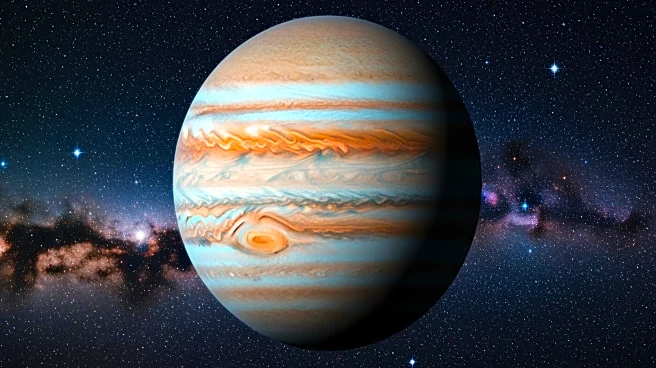What's Happening?
A new study led by scientists at Rice University has revealed that Jupiter played a crucial role in shaping the early solar system, which ultimately influenced the formation of Earth. The research suggests
that Jupiter's rapid growth in its initial years created gravitational forces that carved gaps in the solar system's protoplanetary disk. These gaps prevented the building blocks of Earth and other inner planets from spiraling into the sun. The study utilized computer simulations to demonstrate how Jupiter's gravity created 'cosmic traffic jams,' forming ring-like bands of material that allowed dust grains to clump together and form rocky planets. This process also preserved distinct isotopic signatures in meteorites, providing insights into the solar system's early dynamics.
Why It's Important?
The findings underscore Jupiter's significant influence on the solar system's architecture, highlighting its role in stabilizing the orbits of inner planets and shaping the conditions necessary for planet formation. This research provides a deeper understanding of how giant planets like Jupiter can impact the development of planetary systems, which is crucial for studying exoplanets and their potential habitability. The study also offers explanations for the delayed formation of certain meteorites, known as chondrites, which are considered some of the most pristine materials from the solar system's early days. By understanding Jupiter's impact, scientists can better interpret the isotopic fingerprints found in meteorites and refine models of planet formation.
What's Next?
The study's results could lead to further investigations into the formation of other planetary systems, particularly those observed with similar ring and gap structures in young star systems. Future research may focus on comparing these findings with observations from the Atacama Large Millimeter/submillimeter Array (ALMA) in Chile, which has detected similar patterns in other systems. Additionally, the study may prompt new explorations into the role of giant planets in shaping the habitability of exoplanets, potentially influencing the search for life beyond Earth.
Beyond the Headlines
The research highlights the interconnectedness of planetary formation and the importance of giant planets in creating stable environments for life. It also raises questions about the potential for similar processes occurring in other star systems, which could have implications for the search for extraterrestrial life. The study's insights into the solar system's early dynamics may also inform future space missions aimed at collecting and analyzing meteorite samples, providing further evidence of Jupiter's historical influence.











